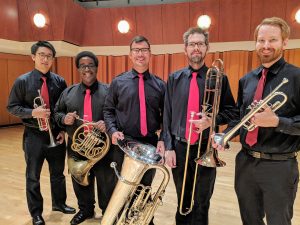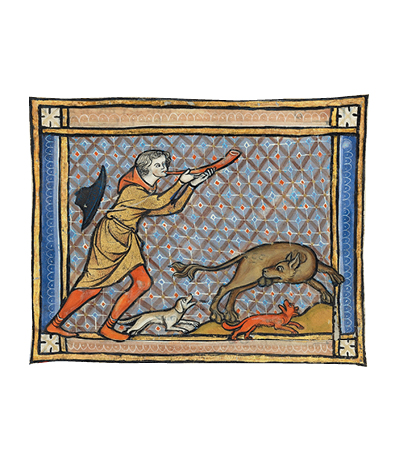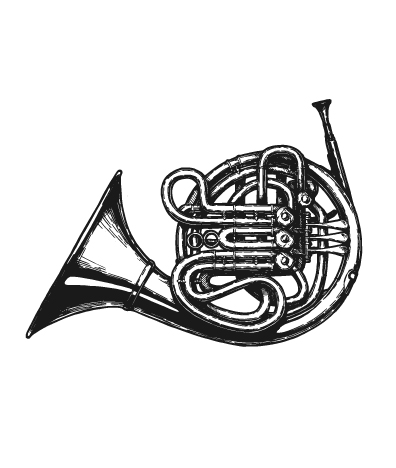Dilon Bryan
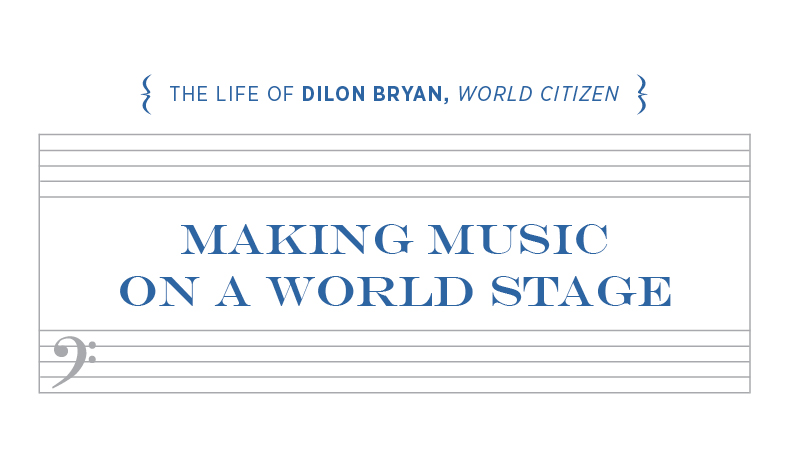
By: Cynthia Adams | Photos By: Nancy Evelyn
Dilon Bryan is a member of the prestigious Bulldog Brass Quintet, entering musical competitions while earning a Master’s in horn performance in the University of Georgia’s Hodgson School of Music. Last summer, he was invited to join the Sistema Europe Youth Orchestra residency at the new Royal Birmingham Conservatorie. There, he joined 200 musicians ages 9-23 from 16 countries in Birmingham, England.
For Bryan, it was a homecoming.
He is an English-born hornist, born into a Jamaican family who first immigrated to the United Kingdom before coming to the United States when Bryan was 10. It would be 14 years before repatriating to his birthplace as a musician last summer—a return that would take him to his home city of Birmingham.
Dilon became a 2017 Gateway cohort in the Graduate School’s Bridge program, according to the Graduate School’s Lisa Sperling. His student mentor, who tracks and reports on Bryan’s musical honors, was Marques Rand Dexter.
His lilting accent is softened by Jamaican, British and Southern influences, as the Bryans moved to Atlanta where his grandmother lived when he was a child.
Bryan’s multi-culturalism adds to his eclecticism and wide ranging interests. In ways difficult to parse out, it also influences his creative life and preoccupations. There is an aspect of him that suggests a younger Malcolm Gladwell, both sharing British births with Jamaican bloodlines, a migrating family, and curious, probing minds—interested in how and why we process the world around us.
A Rich Musical Tradition
It isn’t simple to power a French horn: any number of YouTube videos make that quite clear. It is the longest musical instrument given the 22 feet of tubing involved. And while the “brass family is incredibly loud,” as Bryan says, they are vastly outnumbered during performances, justifying all that exertion. In any given orchestra, there may be merely eight horns to 60 strings.
As a hornist, it is advisable to treat your physical self as an extension of the instrument you play.
Bryan settled on his chosen instrument after having played cello and trumpet, but admittedly remains happily “fixated” on the French horn. He owned his first horn at age 14—a mere four years after immigrating from England to Atlanta. The creative fixation has taken him far—including prestigious opportunities overseas like his stint last year with the Royal Birmingham Conservatorie.
Returning to Birmingham was a homecoming for Bryan.
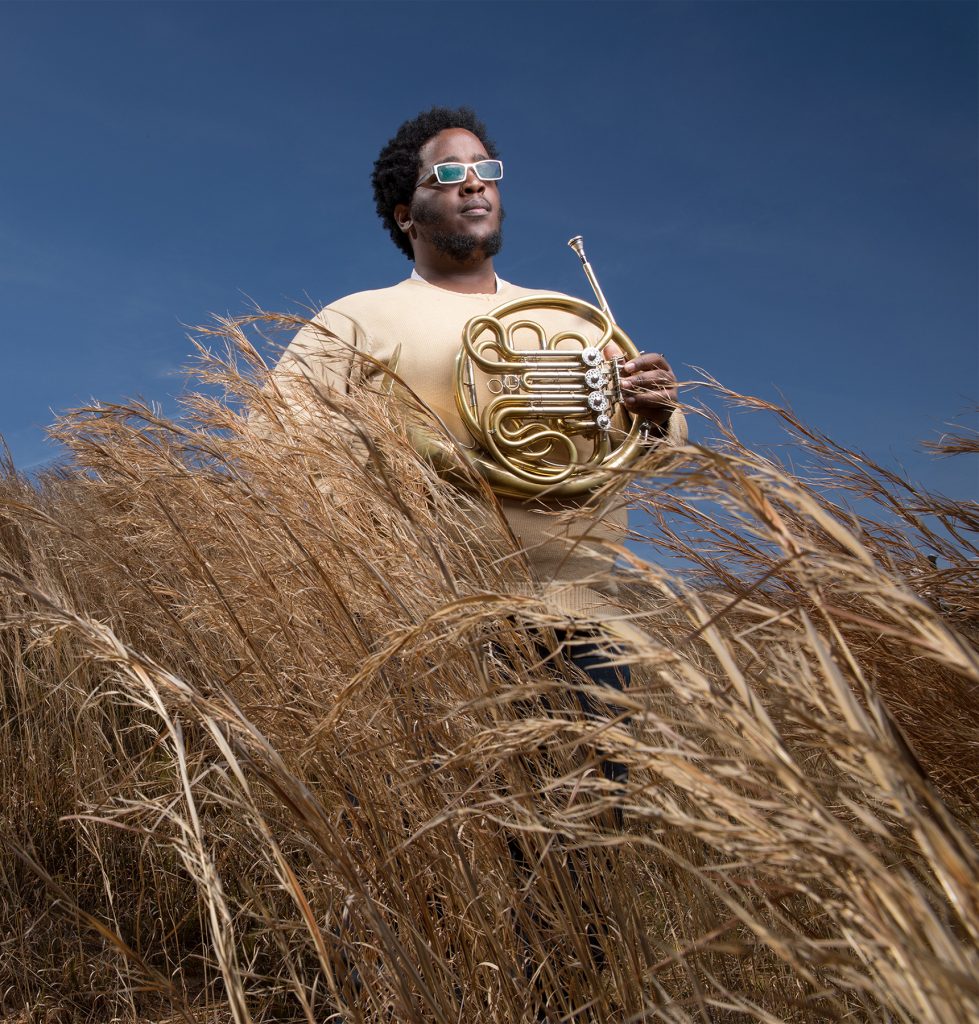
Here in the United States, the young Bryan assimilated, learning to enjoy a quirky mix of Southern fusion British and Jamaican foods while navigating a new culture. So, when Dilon Bryan has an upcoming performance he realizes he best not eat spicy food, nor junk beforehand. Junk food, especially, will make him lethargic. Lethargy is not what a hornist strives for, especially one who has performed nationally at the 2018 Aspen Music Festival with the American Brass Quintet Seminar.
He remembers the tradition of church music in his grandmother’s home, yet there were no other instrumentalists in Bryan’s family other than his mother and grandmother singing—just him and Dalian, his fraternal twin brother, who is in graduate school at SUNY-Fredonia in western New York. Prior to that, the twins attended Columbus State University in Columbus, Ga., each earning undergraduate degrees in music.
He is following a different professional track from his fraternal twin, focused upon performance. Dalian is on another. “He writes music. We’re like a tag team. But we split up for our graduate degrees. He’s doing euphonium & bass trombone performance and composition.”
Their grandmother is Jamaican and immigrated to England before immigrating yet again to the American South and settling in Georgia. As Bryan explains, “the place most Jamaicans wanted to go to was the U.K. or the U.S., seeking a better life.”
Despite its idyllic Caribbean location south of Cuba, Jamaica has a history of political upheaval. Jamaica in the 1960-70s, particularly during the time preceding the birth of the Bryan twins, roiled with politically-charged violence. As a result, Jamaicans suffered heavily from loss of economic stability and escalating crime during a time of destabilizing political strife between the right and left.
Many Jamaican families chose outmigration as brutality, lack of jobs, and strife elevated.
Reggae became the music of protest, growing out of that adversity.
The Pursuit of Happiness
The date when Bryan’s life changed is deeply imprinted. After his tenth birthday in September, they moved October 13, 2004 which fell on a Wednesday. He doesn’t always have that degree of recall, he admits. But the day is significant as the date his family departed the United Kingdom for the United States.
Distinct things happened, and on those occasions, he remembers the dates very clearly, he explains. It was unsettling to leave Birmingham, which was the only home the adolescent had known. “I didn’t know…” Bryan begins, then pauses. “Well, I did, but it became a bigger deal as we led up to the day.
At least he was comforted by the fact that he would be rejoining his grandmother. And he would be leaving the familiarity of life in Birmingham for the unknown with his mom and best friend, Dalian.
When he finishes his master’s this spring, Bryan will be deciding on doctoral programs. There is that—his music—and then there is his personal manifesto concerning the pursuit of happiness.
Bryan cannot do things without feeling a certain sense of joy; doesn’t like to do things out of sense of obligation. He has just left a long rehearsal, and when asked if that fed his joy, he is silent for a long moment and deliberative.
“I can decide how fruitful I want the rehearsal to be,” he answers. He discusses the pursuit of happiness. His self-therapy, when he’s stuck or despondent, or in a funk, is to ask himself what do I really feel like doing?
Whatever it is, Bryan adheres to it.
“Even if there’s a paper I don’t want to do, yet I have to do it, I’m going to be sure I find something about it I really love. If I get into that place, I find the freedom…once there, I can find the freedom.” Bryan describes how he exerts his will in this deliberate way, “even if you limit me.” Free will is extremely important to him; to grasp it, he must understand himself.
Are musicians happier people? Bryan ponders. “The public get to hear the musicians’ release after hours and hours of rehearsal. Everyone’s smiling when they stand up; yet depression is real for them.”
I ask him if musicians are driven to work long and late hours, often alone as required for mastery, or if they are working something out emotionally. He answers, “both.”
He found joy when he participated in the Aspen Music Festival last year. And again, when he was performing in England last summer with Sistema.
The Bulldog Brass Society is the premier graduate brass quintet at the University of Georgia. The BBS were created in the fall of 1996 by Frederick Mills, founding member of the Canadian Brass and professor of trumpet at the Hodgson School until his passing in 2009.
The ensemble performs repertoire ranging from Bach to 20th Century works as well as more popular music including home grown arrangements by their members. The BBS has performed throughout the nation and the world, including a European tour and a special invitation to the Southeastern Composers League Convention.
At top, left to right: Shengduo Chen, Dilon Bryan, Joseph Guimaraes, Steve Jessup and Shaun Branam.
To view highlights from a recent recital click here.
A Meaningful Sharing of Insights
Bryan likes to cook. He often cooks Jamaican food, which of course, is redolent of his home, and makes the requisite jerk chicken. Cooking is an amusement, one he barely touches upon, but it is not a fixation, not like the French horn. Not like Jungian psychology and Myers-Briggs.
This leads back to his own quest to live a meaningful life. It is a topic he reverts to when leaving the subject of music. Myers-Briggs, an evaluative tool, is a key, he says.
“My personality thrives on this (free will); maybe one in every 200 people is my distinct (Myers-Briggs) type.”
Bryan adds, “Truthfully, my brother’s curiosity led the way. Him being curious about music.” Then, he discusses their respective Myers-Briggs personality types. His brother, he explains, is an INTP. The abbreviation stands for introversion, intuition, thinking and perception qualities. This type is often called “the engineer.”
He’s an INFJ, which means he is introverted, intuitive, feeling, judging. This is a rare type, known for social advocacy and action, also known as “the sage”. After a brief moment, Bryan says these differences make for a meaningful sharing of insights. “I’m very happy to have my brother’s take on this profession (music) as well.”
He discusses personalities and the hero function. This, like personality type, is a reference to Jungian psychology and the “hero” as written about by cultural anthropologist Joseph Campbell.
“The hero can get you out of a lot of your slumps; you have a hero, a parent, a child, an inferior function; the hero is where you are heroic,” Bryan explains.
“Your hero is crucial to your consciousness. It gets you out of so many things.”
He continues, saying his brother’s hero is introverted thinking, “which gives him incredibly sound logic. His hunger, searching connections, is part of how his writing of music begins. For me, it’s intuition. I’m constantly trying to figure out what’s the meaning behind this or that. This is where my will power is, my desire is…all of these things. And the meaning behind certain things. In an intuitive state, I need to be feeding this.”
He says that while he struggles on occasion, “I feel I’ve been having a good string of days. I just say, do I want to go and write this paper? No? Then, I’m going to go and talk to this person. If it’s two days in advance and the paper’s due in two days…everything in my spirit wants to do this and get it done.”
Then, Bryan says he’s two weeks out from a paper being due. He grins ruefully.
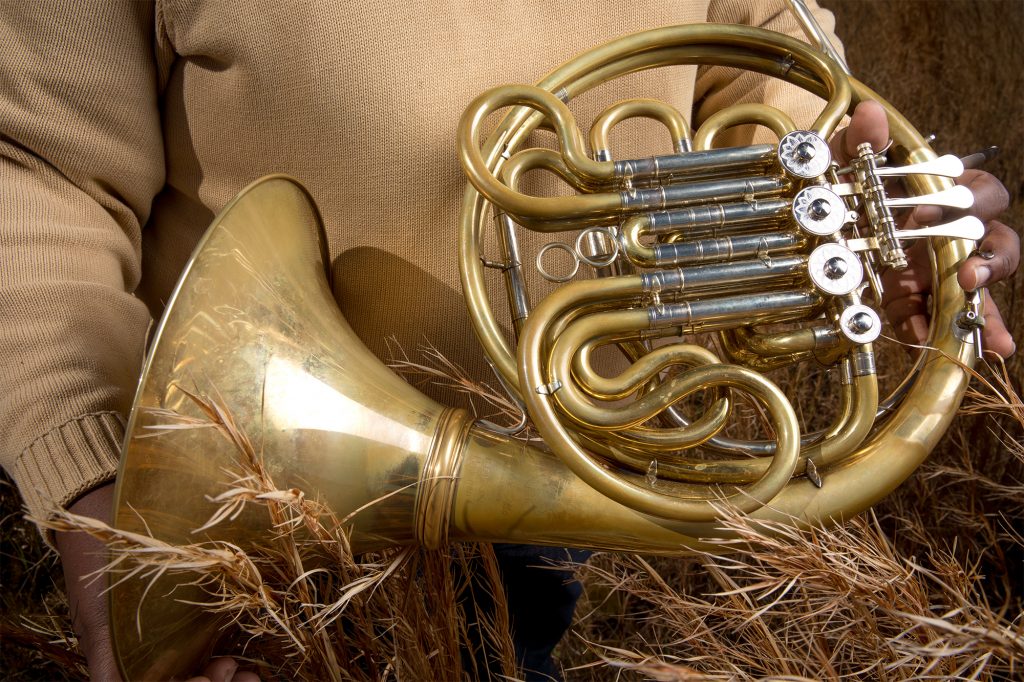
An Ear for Music
If Bryan discovered French horn didn’t do it for him anymore, what would he do?
A silence follows. “That’s scary…but that’s possible. However, helping people and inspiring people is something that I love to do. So, if I were teaching (musicians) it would be meaningful. I have to do that—find meaning.”
His brother “constantly finds a way to get through anything with logic. With introverted thinking and extroverted intuition.” Bryan laments he isn’t quite so agile in working out problems as his twin.
His twin shows him the way, he says.
When I tell him I think they should live in the same town, Bryan laughs and responds, “YES!”
When asked what musician he would give a great deal to have a drink with?
He answers, “I don’t know why this person, but Sir Simon Rattle, former chief conductor in the Berlin Philharmonic. He was also chief conductor in the City of Birmingham Symphony Orchestra near the start of his career.”
He says Rattle “communicates so intelligently. When you experience music at a higher level, it can become so complex no one can understand it. Whatever he says will have a profound simplicity.”
Given he is an introvert, what does he play when he’s alone and wants to bring the mood up? His dinner play list? Music that is specific to moods?
“Bach is cleansing,” Bryan replies. “His music has this same quality of elegant simplicity…it develops a natural way to the ear. It is very clear.”
He says he also likes Rachmaninoff “who plays a lot with hemiola; 3 over 4. He’s not the antithesis of Bach; his music is stormy, heavy.”
Does Bryan like pop? Say, Farrell Williams and the viral sensation “Happy”? “It got annoying after a while. But I like it.”
He brightens, saying how much he likes the music of Bruno Mars.
“I don’t see him saying he hasn’t taken from the greats to make his own voice…good composers write and great composers steal. He knows that. What people want to hear is what they have always loved…not necessarily your new thing. If it speaks to them.” And Bryan says Mars both understands and responds to this.
So, what would be the soundtrack for a biopic of Bryan’s life thus far?
“Um,” he says, thinking. “I have one: Harry Potter. You know the part…at the end of the year at Hogwarts?” Then, Bryan playfully sings a familiar musical riff from Harry Potter’s films, one which signals a significant breakthrough is coming.
“If I had to have a soundtrack, that is it.”
In other words, a breakthrough is coming for the musician now weighing offers from institutions in both Colorado and Pittsburgh.
Cue the horns!
Throughout the last six centuries, the evolution of horns has gone from the most basic of instruments used for hunting and announcements to more sophisticated musical versions designed to elicit the most melodious sounds.
The history of horns starts with the use of actual animal horns, hollowed out of the marrow, and blown into to create loud sounds announcing celebrations and the start of feasts, as well as for sharing warnings, such as the approach of enemies and threats.
Making the transition from a method of communication to a way to create music, horns were first formally seen being used as musical instruments during 16th century operas. They were made from brass and mimicked the structure of the animal horn. Unfortunately, they provided a challenge for adjusting notes and tones. As such, horns of different lengths were introduced, and players had to switch between them throughout a performance. While this did provide some added flexibility, it wasn’t an ideal solution, and horns weren’t widely used.
During the 17th century, additional modifications to the horn were seen, including the enhancement of the bell end (larger and flared bells) of the horn. After this alteration was made, the cor de chasse, or “French horn” as the English called it, was born.
The first horns were monotone instruments. But in 1753, a German musician called Hampel invented the means of applying movable slides (crooks) of various length that changed the key of the horn.
In 1760, it was discovered rather than invented that placing a hand over the bell of the French horn lowered the tone, called stopping. Devices for stopping were later invented, which further enhanced the sound that performers could create.
https://www.thoughtco.com/history-of-the-french-horn-1991798





